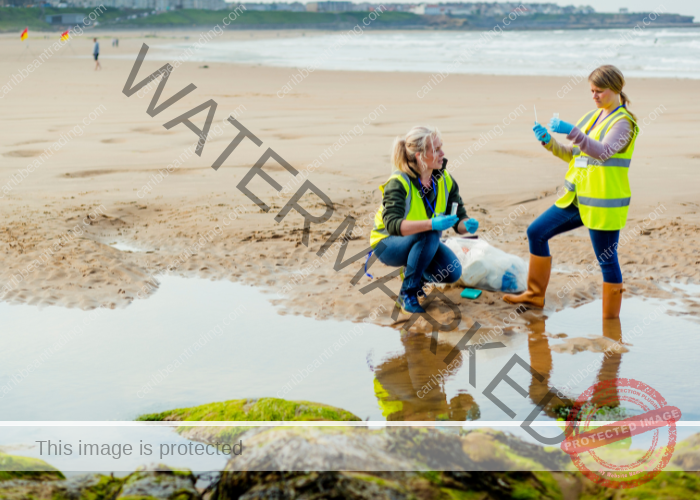Wildlife in the Caribbean
Caribbean Environmental Conservation: How Can Companies Contribute?
Oh, the Caribbean. The region with some of the best beaches, coral reefs and hear this: some of the world’s finest tropical places! What’s not to love about it, right? But there’s something really important to address: it’s under a constant danger: degradation and climate change. It’s ours responsibility to do something if we want to achieve sustainability and avoid more issues.
First of all, we gotta start protecting the environment by adopting green practices. How? Well, this article is gonna give you the best ways to contribute to this care, especially if you want to adopt Caribbean environmental conservation packaging as a main strategy.
The Importance of Environmental Protection in the Caribbean
Lemme tell you something really interesting: did you know the Caribbean is rich to many ecosystems? Coral reefs, mangroves, rainforest, seagrass and many more! They’re really important for a reason: maintaining ecological balance. So, we gotta do what we must to keep them alive! Not only for wildlife, but also because they protect the coast, food and carbon sequestration. Currently, people is actively working to reduce the plastic pollution from the island, as well as facing other issues like overfishing, deforestation and high sea levels. All of them are part of climate change, and must be stopped!
You definitely know the region’s main income is tourism. With many people visiting this people, it’s a given we must protect it. Hotels and shops must help to influence the care of the environment, adopting practices that reduce footprint.
Sustainable Practices for Companies in the Caribbean
Okay, so you know about the importance. Now it’s time to address it. What can be done, and how? Well, luckily there are many strategies that companies in the Caribbean can adopt if they want to make the world a better place. First of all, using less energy. Reducing waste, using less water and supporting the locals are vital too. Check these amazing tips too:
Energy Efficiency and Renewable Energy
Did you ever ask yourself how a business reduces carbon footprint? If not, lemme tell you. Investing in energy-efficient tech is a must for companies that want to help the world. For example, taking advantage from the wind and sunlight! Isn’t that smart? This greatly reduces gas emissions, as well as the costs, since you’d be using way less energy. Start installing some solar panels too if you wanna help the world!
Waste Reduction and Recycling
Reducing waste is always complicated, especially in a region like the Caribbean. But why? Because inadequate waste disposal can lead to pollution of the waters, which is a complicated thing to fix. So, what can be done? First of all, we must promote recycling, and the future reduction of waste. After that, we can start reducing pollution, composting organics, implementing new programs and helping both locals and toursits with strategies that are more eco-friendly.
Water Conservation
You have probably heard about the fear of water scarcity. Even when the planet’s almost covered with water, it’s not a renewable resource. We must implement strategies to protect its usage, especially in the Caribbean. Climate change and tourism demands a lot of use, so having tech that helps regulate this (such as low-flow water and recycling) is vital. Educating the locals and tourists alike is another important task to do.
Supporting Conservation and Community Initiatives
Saving water and energy is a must, but the task doesn’t stop there. There’s still plenty of things to do! Take a step further into the right direction by supporting green initiatives. That’s right: sponsor conservation efforts and do your good deed! There are many: marine life, cleaning beaches or restoring habitats. All of them will not only raise your reputation but will build a stronger relationship with locals.
The Role of Healthy Packaging in Environmental Sustainability
Let’s address the “elephant in the room”. Plastic usage is one of the main causes of water pollution and waste, threatening marine life and many lives. So if you wanna make a real impact as a company, start adopting healthy packaging programs ASAP! Kanbol has really interesting options you might want to check! Styrofoam and plastic use must be stopped, so switch for biodegradable or compostable ones.
But why? Because it reduces the environmental impact, having a shorter lifecycle that is made from renewable resources, meaning it can be used again later. Paper, bamboo and plant plastics will break down eventually, not harming anyone.
Benefits:
- Reduction of Plastic Pollution: This is extremely important! Why? Because eco-friendly packages are vital to reduce plastic waste. Most of it usually ends in the beaches and oceans, harming not only people but the lives that are there. Beaches will also look much better if they’re clean! So, supporting a sustainable destination is great.
- Lower Carbon Footprint: Reducing the carbon footprint is vital if we wanna emit fewer greenhouse gases. The main reason behind is to have less packaging. Be sure to recyclate!
- Support for Circular Economy: Eco-friendly packaging aligns with the principles of a circular economy, where materials are reused, recycled, or composted, rather than disposed of in landfills. By adopting healthy packaging, companies can promote a more sustainable and circular approach to resource management.
- Enhanced Brand Image: Consumers are increasingly aware of environmental issues and are more likely to support companies that demonstrate a commitment to sustainability.
Challenges and Opportunities for Companies
The opportunities to make the world a greener and better place are endless, but it’s also true that challenges are arising. Most of these strategies demand more cost, and the access to such materials are often harder to find. If you don’t have the infrastructure, it can be a huge issue. But thinking about the bright side: the long-term benefits of this are HUGE. You’ll save money, make yourself reputable in the eyes of the community and more!
In case you’re struggling, seek a partnership. There are many local or worldwide organizations that specialize in helping companies transitioning to a greener approach. Suppliers, NGOs and more will provide you these resources and experts if you need ’em. This way, you’ll train your employees and educate customers about an eco-friendly future.
Conclusion
So, keep this in mind when you ask yourself: what can American tourists do to help improve the caribbean’s environmental concerns? The answer is: We must take care of our world! Environment in the Caribbean is something everyone must protect, not only the locals. Businesses, governments and even tourists must do their part. Example is vital to preservate the region’s beauty. Sustainable practices is what will keep the world green and safe!
So, what can you do? First of all, embrace energy efficience. Reduce the wastes and save water if possible. Healthy packaging solutions is also a must if you work with gifts and stuff like that. All of this ensures a safer world for the upcmoing generations. Luckily, tourism is going sustainable and eco-friendly products keep growing, which makes everyone hopeful!
We do our part, and companies in the Caribbean must do theirs too. It’s our job to safeguard the environment, to protect this paradise forever!
FAQs
What are the shipping options?
Caribbean Trading offers Priority for USPS services. Upon request of the user, it can also be shipped via UPS, FedEx or DHL, although you must consider that shipping platforms count Puerto Rico as an international destination, while USPS considers it domestic for United States. Currently, our shipping is only for USA.
Can I return my products?
Most new and unopened products have 30 days after delivery to refund. In case you received the incorrect item or a failed product, Caribbean Trading will cover the shipping costs. If you can see that the package is damaged when received, refuse it immediately.
Do Caribbean Trading accept corporate orders?
Yes! We specialize on corporate and group gifts. We have worked with a variety of companies of all size. Our warehouse and production facility allows us to handle orders of any size you might have!
What are the payment methods?
You can either buy with credit card or via phone. We value your online privacy and security! If you don’t want to fill your credit data on the web, call us: 787-888-2762.







